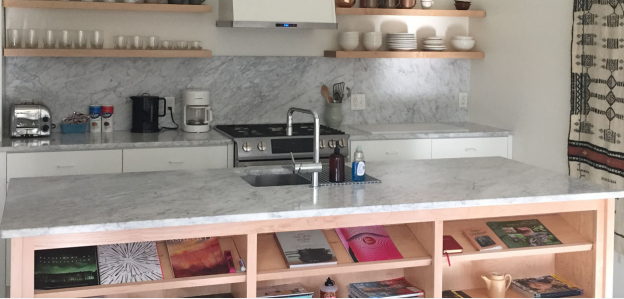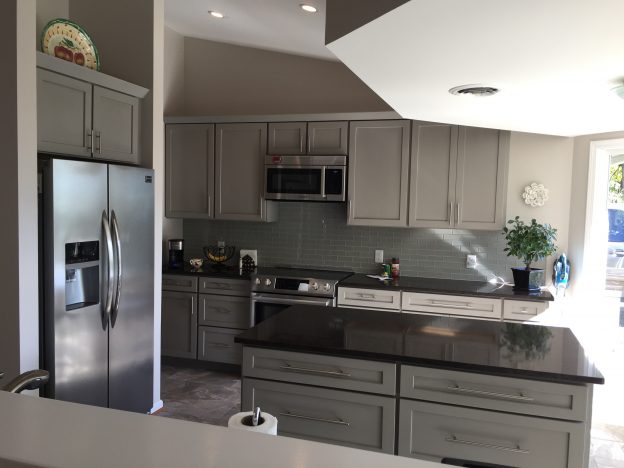For many years, granite has been the rage in kitchen countertops, but lately, we’re finding that many homeowners are choosing quartz over granite. Granite is a 100 percent natural hard stone mined from quarries, then cut down and polished. Quartz is comprised of about 95 percent natural quartz that is ground up and then mixed with a small percentage of polymer resins to hold it together.
Quartz offers a wide variety of design options, is easy to clean, and resists germs. It’s also environmentally friendly and almost impossible to damage. While granite is certainly still a great choice for kitchen countertops, there are some important factors to consider when deciding between granite and quartz:
Appearance. Because granite is a natural stone, no two slabs will be the same. Many people love its natural look, but you won’t always be able to find a specific color or pattern to match your kitchen. If you decide later to add more countertops or if one of your granite slabs breaks, you might not be able to find a slab that matches what you have. Quartz has the advantage of having the look of natural stone while giving you many colors and patterns to choose from; if you ever need to add or replace your countertops, you can easily match what you have.
Cleaning and Upkeep. Granite needs to be cleaned daily, and certain oils and acids can stain it. You’ll need to reseal granite countertops about once a year to protect its naturally porous surface from heat and stains. Quartz only needs to be cleaned with soap and water daily, and that’s it! Its nonporous surface naturally resists bacteria, and many quartz manufacturers add an antibacterial coating that provides even more protection against germs. (For helpful tips on keeping your countertops clean, click here for granite and here for quartz.)
Heat. Granite is highly heat resistant as long as it’s sealed properly. Quartz can handle up to 150 degrees of heat, but the resin can become discolored when exposed to heat for a period of time, so you’ll want to be sure to use trivets or hot pads when placing any hot items on its surface. The resin in quartz can also become discolored when exposed for long periods of time to direct sunlight.
Durability. Quartz is more durable. It’s harder than granite and almost indestructible. Granite can be damaged with high impact blows, such as dropping a heavy frying pan on it. Small chips in both quartz and granite can be repaired using an epoxy kit that you can purchase at a home improvement store.
Cost and installation. Quartz tends to cost a bit more per square foot than granite, but the price of either will depend on the type, size, and quality that you buy. Buying larger granite slabs can increase the cost per square foot; any specialized edges will increase the cost of quartz. You’ll want a professional to install either type of countertop; not only are both materials very heavy and will need to be handled with care, but a pro can cut the seams in a way to make them less noticeable and ensure that they fit well around your cabinetry and sink.
Environmental Friendliness. Quartz wins the prize for being more environmentally friendly than granite. Granite is quarried, which uses a great deal of energy to cut and transport it. Quartz is engineered; if you use local manufacturers, it cuts down on energy and transportation of the materials.
Mountain West Construction uses Cambria countertops, which is the only American-made, family-owned producer of natural quartz in the US. You can check out all their options for styles and colors at their website. Then give us a call at 828-697-8894 to discuss how we can help you choose the best countertops for your kitchen upgrade!



